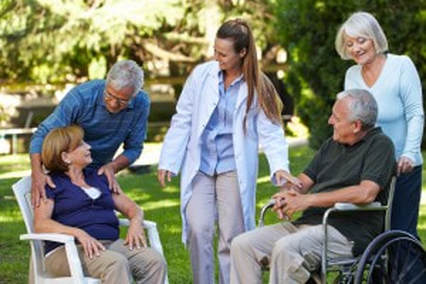|
When a loved one reaches a point in his or her life in which self-care becomes challenging, the next step may be a little overwhelming; particularly when trying to make the best choice for your loved one and your family. Some families struggle with guilt because it may not be financially, emotionally, or physically feasible for some individuals to become a caregiver. Often times a hired in-home caregiver is only a temporary solution until the aging or ill loved one requires more specialized care. Unfortunately, more often than not, many people are hesitant to choose the most common option of a nursing home facility due to the horror stories or bad reputations they can have.
Although a nursing home can be an intimidating next step, if you know what to look for and monitor closely, your elderly loved one can continue to live a healthy and safe life. Myth #1: Nursing Homes Mark the “Final Days” of an Elderly Individual While it is true that many elderly individuals may live their final years in a nursing home, it doesn’t automatically mean that an elder is living his or her last days. A nursing home is not a hospital, as it often mistaken for, but does have medically trained staff available 24 hours a day. Nursing home candidates do not need to be in a hospital, but are no longer to be cared for in their home or cannot take care of themselves. Although a majority of nursing home residents are older seniors, some younger seniors have short stays in a nursing home after a lengthy illness or after a surgery. Myth #2: “If I move my elderly relative into a nursing home, he’ll lose all of his independence.” When selecting a nursing home, many are fearful to move someone into a facility out of fear that he or she will have no independence. Many facilities respect and even encourage independence as much as possible. Even if one individual may have mobility issues, the staff will encourage other independent activities such as eating, grooming, and participating in activities. When deciding on whether or not to move your loved one into the appropriate care, keep in mind that the need for assistance is not the result of a loss of independence as we all require help sometimes. Myth #3: “If my loved one moves into a nursing home, she will be mistreated by staff and there will be nothing I can do.” We’ve all heard the terrible stories of nursing home abuse or elder abuse. Unfortunately, these stories of physical, emotional, and financial mistreatment are true, but they don’t apply to every nursing home facility across the country. First off, the best way to prevent elder abuse from occurring is by being active in your elder’s life. Before you choose a facility, take a tour, look around, and ask questions because this is the time in which you are interviewing facilities in search of the best possible care your loved one can receive. If anything feels or looks wrong, you don’t have to settle for that particular home. Be sure to educate yourself on how to recognize and respond to any sign mistreatment of your loved one. Once you have found a suitable home for your elder, visit often, communicate regularly with staff, keep track of any changes to physical appearance and his or her emotional or mental state. Changes could be part of aging, but it could also indicate abuse. If you suspect any abuse, contact authorities immediately. This next chapter in your loved one’s life can be a positive transition and an opportunity to feel confident that they are being provided with the best care and surrounded by friends and family.
0 Comments
Leave a Reply. |
ArticlesRead important articles and blogs from respected authorities and first-hand experience. Archives
July 2018
Categories |


 RSS Feed
RSS Feed
